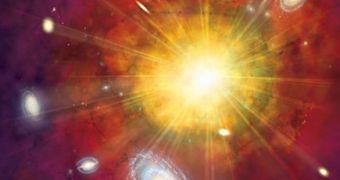A shocking new theory in the world of physics suggests that we might have accidentally brought the universe closer to its death, just by looking at it. The observation of the dark matter back in 1998, which is thought to be responsible for the acceleration of the cosmic expansion, may have caused the universe to shift to a state similar to one in its past, in which the universe had more chances to end.
Physicists Lawrence Krauss of Case Western Reserve University in Cleveland, Ohio and James Dent, obtained the startling result in a research related to the calculation of some of the previous states of the universe. The theory regarding the birth of the universe and the Big Bang states that the universe came to existence when a weird high-energy "false vacuum" suddenly appeared, which eventually decayed to an ordinary vacuum due to a gravitational repulsive force, about 13.7 billion years ago.
During the transition between false vacuum to ordinary vacuum, the energy released was converted into extremely hot matter. The fact the dark matter was discovered reveals that in fact, that vacuum did not completely decay to ordinary vacuum, but it exists in a false state, meaning that the vacuum is not completely empty, but is still contains some level of energy, which is causing the universe's expansion acceleration.
Studies show that this kind of transition happens randomly, similar to the process of nuclei decay, so it is possible that the reverse transition to false vacuum may happen again, destroying all the matter in the universe, and the fact that we are still experiencing the universe means that this shift didn't yet take place. Physicists are still pondering what could trigger such a catastrophic event, especially the possibility of sudden matter decay since the false vacuum has decreased exponentially for the last 13 billion years.
The first calculations regarding the universe stability threshold were made by Krauss in the 1950s, and concluded that the chance that the universe will remain stable over a infinite period of time is substantially increased. However, in 1958, a Russian physicist L. Khalfin, discovered that the chance of the current quantum system surviving over long periods of time are decreasing exponentially, to a point where it will suffer a transition to a smaller rate of decline, meaning the universe will survive forever.
Krauss says that the transition point can be found by determining the energy between the false vacuum and zero energy. Observations of the visible universe show that we live in a universe in which the energy of the vacuum is above zero, therefore we have past the shift point.
This should be good news, meaning that the universe will survive; however, we might have already influenced its future through the quantum Zeno effect, which states that every time we observe or measure matter at quantum levels we reset and stop its decay. Observations of the light that suggests that dark matter indeed exists could have possibly reset the state of the vacuum to zero, to a point where the universe may suffer a false vacuum transition, and cease to exist.

 14 DAY TRIAL //
14 DAY TRIAL //